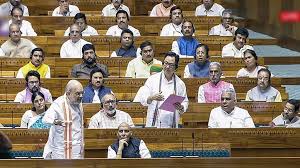NEW DELHI: Amid vehement objections to the Waqf (Amendment) Bill by the Opposition, which termed it as being against federalism, and even its own allies expressing reservations on it, the Centre on Thursday decided to send the controversial legislation to a joint Parliamentary committee (JPC).
After replying to discussion on the Bill, Minority Affairs Minister Kiren Rijiju said that it was being referred to the JPC for wider consultation. The panel would be formed after consultations with all parties and would comprise members from both the Houses of Parliament.
The Bill proposes renaming the Waqf Act, 1995, as the Unified Waqf Management, Empowerment, Efficiency and Development Act, and aims to streamline the manner of registration of Waqf properties through a central portal.
The tone was set for sending the Bill to JPC after TDP MP Harish Balayogi said during discussion that his party won’t mind sending it to a Parliamentary committee.
“If wider consultations are required to remove misconceptions and wrong information, we have no problem sending it to a select committee,” he said. The Opposition called the Bill an “attack on the Indian Constitution, the religious freedom it guarantees and a violation of the federal structure”.
The YSR Congress, which had been a fence-sitter for the last five years in both the Houses, also opposed the Bill, with its leader Midhun Reddy saying that he supported the Opposition’s stand.
Rijiju accused the Opposition of spreading rumours by claiming that the BJP was trying to create a communal divide. He informed the Lower House that the amendments were based on the recommendations of the Sachar Committee which had been formed by the erstwhile UPA regime.
Consultations on the bill had been going on since 2015, the minister said. He also claimed that even Opposition MPs had met him privately, pledging their support to it.
Earlier, while introducing the Bill, Rijiju argued that the existing law did not serve its purpose and said the amendments would “correct the mistakes” and “bring in discipline”.
The proposed changes would reform Waqf boards and give more powers to those communities within the Muslims which had been oppressed by the majoritarian voices, the minister claimed.


